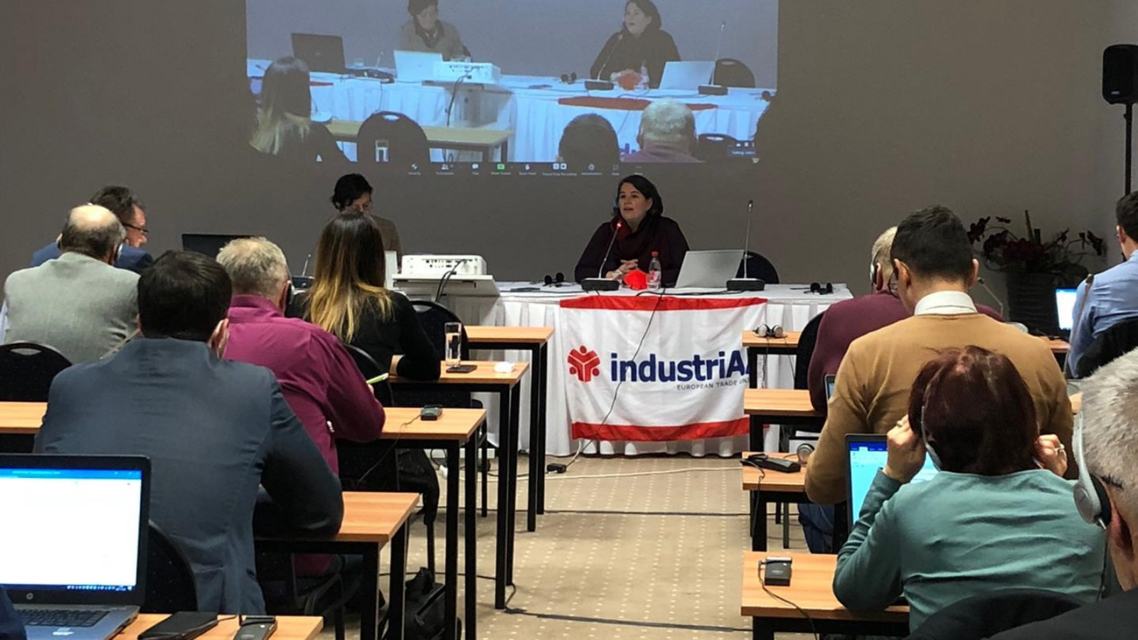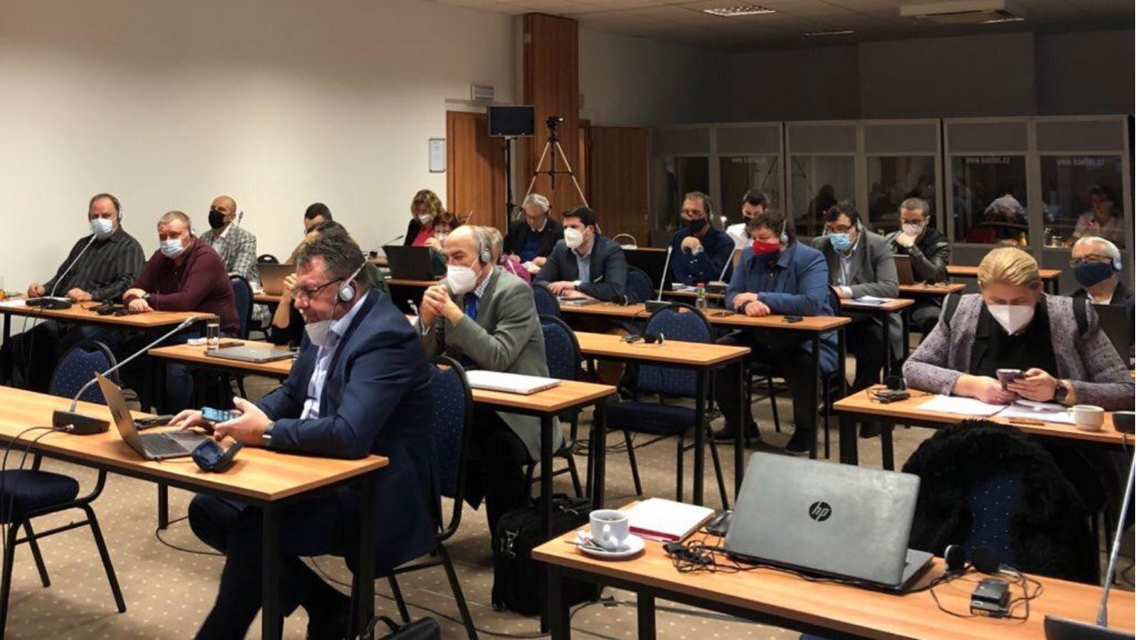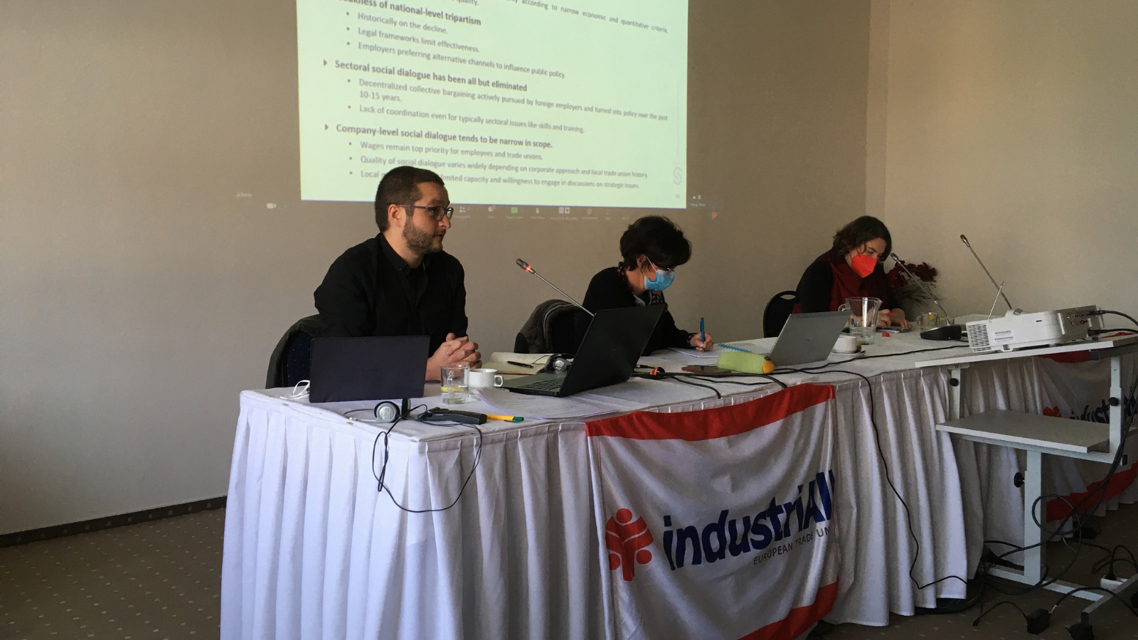The Green Deal is an agenda led by public authorities. These authorities therefore have the responsibility to ensure quality jobs in a carbon-neutral and digitalised economy.
Ahead of the European Commission’s new proposal on the social dimension of the Fit for 55 Package, due in December 2021, industriAll Europe met with affiliates from Central and Eastern Europe in Prague, Czech Republic. The focus of the meeting was on how to ensure a Just Transition and the maintenance and creation of good quality jobs in Central and Eastern Europe, where the Green Deal and Fit for 55 Package will be more challenging compared to other regions in Europe.
The event in Prague brought together trade union representatives from Poland, the Czech Republic, Slovakia, Hungary, Romania and Bulgaria. Countries in Central and Eastern Europe are likely to be the hardest hit by accelerating the pace of climate policies, whereas they are the least equipped to master the transition in a way that quality jobs are maintained and created on the road to net zero emissions.
Experts from HIVA (KU Leuven) and Syndex Romania presented initial research findings to explain how trade unions can anticipate these changes and some of the regional challenges, such as:
- the economic dependency caused by a very high share of foreign ownership
- the subordinate position in transnational value chains
- the weakness of national-level social dialogue, especially at sectoral level (caused by a decentralisation of collective bargaining actively pursued by foreign employers and the austerity policies)
- limited or lack of long-term national strategies
- lack of comprehensive industrial strategies by national governments and, in some cases, lack of a stable government.
Sander Happaerts, representative from the European Commission’s Directorate-General for Regional and Urban Policy, in charge of the Just Transition Mechanism, was present in Prague and presented the Commission’s programme to support the coal- and carbon-intensive regions that will be highly affected by the green transition. These regions will be supported by the Just Transition Fund. To receive financial support, Member States must submit Territorial Just Transition Plans, which should, in principle, be developed with the social partners. However, trade union involvement in most countries, except the Czech Republic and Poland, has so far been very limited. IndustriAll Europe hopes that the Territorial Just Transition Plans, due in December 2021, will correct this situation and involve trade unions more systematically in the following months and years. A Just Transition implies involving workers and their unions in anticipating change and the transformation of jobs. They know the specificities of their region, the competences of workers, their skills and re-training needs.
Judith Kirton-Darling, industriAll Europe Deputy General Secretary, highlighted the urgent need to translate Just Transition into concrete policy: “With the Green Deal we see climate legislation accelerate the speed of the transition in our sectors. But we do not see hard legislation at European level strengthening the rights of workers to anticipate the changes. Just Transition is about the anticipation and management of change, and the rights of workers to shape their future. We need a legal framework on the anticipation and management of change that will ensure the involvement of workers and their unions in strategy-building.”
Isabelle Barthès, industriAll Europe Deputy General Secretary, said: “The twin green and digital transitions must be addressed together in our ambition for a Just Transition. They must lead to quality jobs. The Green Deal is an agenda led by public authorities. These authorities therefore have the responsibility to ensure quality jobs in a carbon-neutral and digitalised economy. Technological progress and climate ambitions must go hand-in-hand with social progress. This can only be achieved if workers’ and trade union rights are guaranteed, and if social dialogue and collective bargaining at all levels - especially sectoral level - are strengthened through the necessary legislative support in countries where it is needed.”
The event in Prague was the first in a series of 7 regional workshops that will take place across all regions of Europe until March 2022. They are part of industriAll Europe’s Just Transition Campaign ‘Nothing about us, without us’. Next stop is Madrid on 15-16 December 2021.
Contact: Andrea Husen-Bradley (press and communication), Patricia Velicu (policy adviser)



